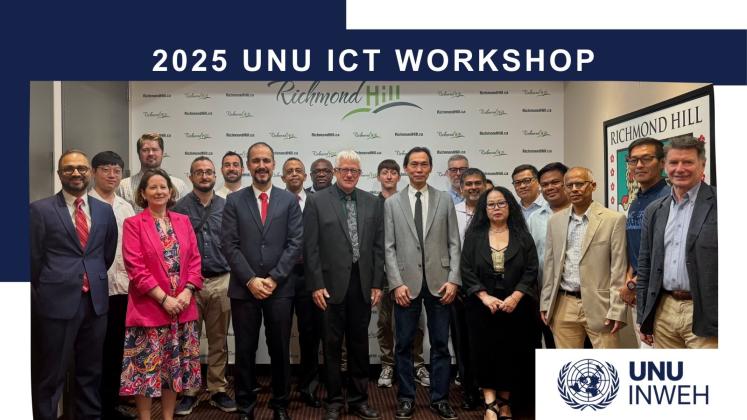Richmond Hill, Ontario, 21 July 2025 - From 14 – 18 July 2025, representatives from across the United Nations University (UNU) system convened at the United Nations University Institute for Water, Environment and Health (UNU‑INWEH) in Richmond Hill for the UNU ICT Network’s annual workshop. The week‑long event aligned with UNU’s ICT Strategic Plan, delivered fresh insights into how information and communications technology (ICT) can sharpen academic outcomes, widen impact, and streamline operations across the UNU system.
The workshop opened with a video greeting from the Rector of the UNU system, Prof. Tshilidzi Marwala, followed by a warm in‑person welcome from Richmond Hill’s Mayor David West. Their joint remarks set a collaborative tone and highlighted the City’s commitment to fostering innovation, digital inclusion, and global partnership, as the host of the UNU-INWEH in Canada.
Initiating the keynote sessions, Prof. Kaveh Madani, Director of UNU‑INWEH underscored the Institute’s role as a leading international research and training hub in water, environment, and health, and shared updates on ongoing, high‑impact projects. This was followed by an address by Dr. Ng Chong—UNU Chief of Information Technology and Director of Campus Computing Centre—who officially launched the workshop by outlining its theme and agenda. He emphasized how AI and technology support the University’s ICT Strategic Plan, the importance of understanding the true capabilities of our tools, and how genuine innovation arises when advanced tools are combined with deep human insight to achieve meaningful results.
In line with the ICT Strategic Plan, the first session examined the Artificial Intelligence Landscape and UNU’s AI Roadmap, illustrating how AI can streamline back‑office operations and accelerate research workflows. This was followed by a session on Digital Governance and Security Policies, which outlined frameworks for data governance and security. Next, the UNU ICT team explored the Strategic Vision for UNU’s new Programme and Project Management System, shaping an advanced solution that supports delivery of research on time, within budget, and with maximum impact. In the final session, the team explored the future expansion of the UNU ICT Network, unveiling new collaboration pathways to strengthen the unified community.
Private sector and UN partners enriched the program with cutting‑edge perspectives, such as a Microsoft representative who explored powering AI transformation with the Microsoft Cloud, followed by an Amazon Web Services (AWS) official who discussed cloud infrastructure for scalable research solutions. Next, the International Fund for Agricultural Development (IFAD) provided an overview of its strategy for AI implementation and development of its AI ecosystem. Lastly, colleagues from the United Nations Development Programme (UNDP) provided insights regarding digital innovation in Information technology service management
Their contributions highlighted practical pathways for harnessing cloud, data analytics, and digital innovation to streamline UNU’s operations and amplify research impact.
During the workshop, the UNU‑INWEH team showcased ongoing projects that illustrate how technology can sharpen academic outcomes and broaden impact, giving participants concrete examples they can adapt within their own UNU units.




